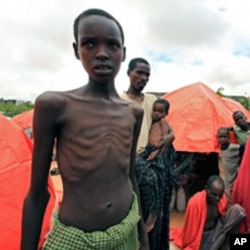The U.N. is warning that famine conditions are likely to spread beyond southern Somalia in the next four to eight weeks.
Fatoumata Lejeune-Kaba, spokesperson for the UNHCR, said that conclusion is based on several factors that determine severe hunger and famine.
“Given the current levels of malnutrition,” she explained, “ the mortality rate, the limited humanitarian response to parts of south Somalia because of violence, and the combination of increases in food prices and harsh dry seasons, the food security is expected to deteriorate in the coming months.”
Lejeune-Kaba said aid groups partnering with the UNHCR are predicting all areas of Somalia will likely face famine by August or September.
She said relief groups there are hindered by fighting between the government and Islamic militants who control large parts of the country.
“We need access to help people where they are and we’re not, unfortunately, in a situation where we could immediately help, whether it’s the UNHCR or other agencies-- as long as the fighting is going on,” explained Lejeune-Kaba.
The United Nations says the number of Somali refugees in the Horn of Africa has topped 860,000, many of them forced out by the ongoing drought and famine.
The U. N. Refugee Agency says another 1.5 million Somalis are internally displaced, mostly in Somalia's south-central region.
A report issued August 3, says many Somalis fled their homes after the last of their livestock died, depriving them of income and food.
Somalia is at the center of the worst drought to hit the Horn of Africa in 60 years. The United Nations says more than 12 million people in the region are in need of food aid.




